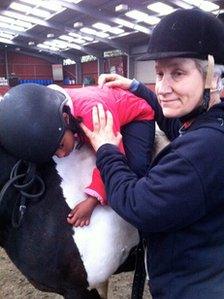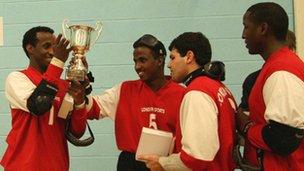Paralympics legacy: 'We have to tell people they can'
- Published
Prime Minister David Cameron said the Paralympics would inspire a generation and show how Britain has been a "trailblazer" in disabled sports.
In part, fulfilling that pledge is down to the individuals devoted to running precious sports clubs, often on a voluntary basis.
They say disability sports give freedom, confidence and self-esteem but their work will be far from over when the Paralympics are.
In London, just over 20% of disabled people participate in sport once a week, compared with 36% of non-disabled people, according to government agency Sport England.

Jo Roach raises money partly by auctioning used bikes donated by the police
Club managers say changing disabled people's attitudes and communicating about what is on offer are challenges as big as trying to secure funding.
'Good stories'
"This is freedom," said a young man simply when he first tried a three-wheeled bike at Jo Roach's cycling club.
He has cerebral palsy and has trouble walking, explained Mrs Roach, 61.
"It's unimaginable seeing that sort of thing," she said. "We have a good news story every time we meet."
She started the group in 2004 after looking for a club for her daughter Suzie, who has a developmental disability and loves cycling.
She could not find a club so she started her own, which meets in Finsbury Park, north London, and is attended by up to 70 people.
"I have to learn as I go along," Mrs Roach said, admitting she sometimes feels a bit over-stretched.
"My absolute ambition at the moment is to establish our cycling club as an organisation with properly paid workers and someone being paid to do what I do to demand a really high standard."
She raises money through everything from cake sales to auctioning used bikes donated by the police.
'Need Challenge Anneka'
Meanwhile, in west London, it is a nun who was Britain's first female firefighter who has devoted herself to introducing disabled youngsters to riding.

Sister Langdon's riding centre was backed by BBC Challenge Anneka
Sister Mary-Jo Langdon started Wormwood Scrubs Pony Centre in Shepherd's Bush, in 1989.
It was the first major stable predominantly for disabled riders in London and received a kick-start from BBC programme Challenge Anneka, which built an indoor arena.
Sister Mary-Jo explained that the feeling of elevation from sitting on a pony gives a psychological boost.
"It must be an amazing feeling for a child in a wheelchair who people bend down to speak to," she said.
"Some youngsters may require more help and guidance but trying to make them as ordinary as possible is one of the main aims of the centre," she said.
But funding the keep of 15 ponies is an ongoing challenge.
"We need serious financial commitment," she said.
"We need another Challenge Anneka to keep us gong for the next 25 years."
'Gives confidence'
London Goalball Club is the only club of its type in London, said chairman Steve Troy.
The game was started in 1947 for blind ex-servicemen. It is played using a ball with bells in it.

Iran has more goalball players than Britain said London Goalball Club chairman Steve Troy
Despite being long-established, participation levels in Britain are very low, said Mr Troy who was born blind.
"Iran has something like 1,000 players. We have 200 at most," he said.
He believes communicating about the sport is a difficulty and he is in talks with Goalball UK to host a taster session at the Copper Box Arena after the Paralympics.
"Goalball gives you the chance to be aggressive. It helps you with your mobility," he said.
"If you can move freely around a court it gives you confidence to move around outside."
Paralympian Justin Frishberg, chairman of London Wheelchair Rugby Club, believes people's own perceptions of what they can achieve are often the biggest barriers.
'Achieve incredible things'
Mr Frishberg, who broke his neck in a rugby accident, said: "People write themselves off. We have to tell people they can.
"You come from being in a hospital bed thinking 'I've got nothing now' but we've all come from that position.
"If you put in the effort you can achieve incredible things."
He added that as well as being good for self-esteem, the sport offers support.
"There's the whole social side of being around disabled people who have had similar problems and been there and done that," he said.
- Published31 August 2012
- Published29 August 2012
- Published28 August 2012